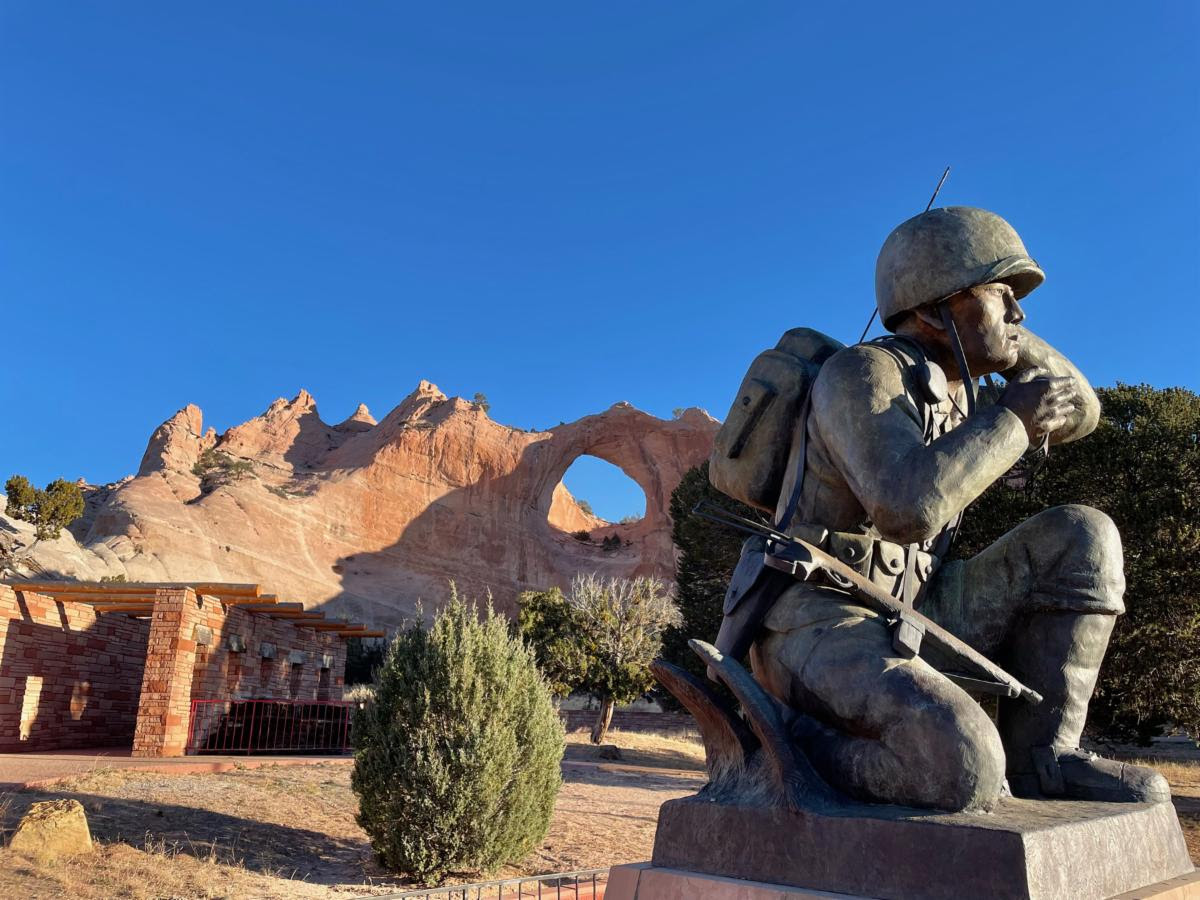
- Details
- By Native News Online Staff
The Navajo Nation recognizes August 14 as Navajo Code Talker Day. The 25th Navajo Nation Council honors and commemorates the remarkable legacy of the Navajo Code Talkers for their extraordinary sacrifices and contributions to the United States during World War II.
On behalf of the Council, Speaker Crystalyne Curley offers her heartfelt appreciation to the Code Talkers and spoke about the vital role of the Navajo language during World War II and the importance of passing the sacred language to younger generations.
“The use of Diné bizaad, our sacred language, to safeguard our freedom serves as a profound example for us all. On the front lines of the most historic battles, the young Diné Marines used our language to protect soldiers and our homeland. Our language is powerful and sacred. It’s important that we teach our language to our younger generations to sustain our identity and strengthen our people,” said Speaker Curley. “Today, we are fortunate to still have three Navajo Code Talkers with us, Thomas H. Begay, John Kinsel, Sr., and former Navajo Tribal Chairman Peter MacDonald, Sr. We also offer our prayers to the families of the Code Talkers who have passed on over the years.”
The day honoring the Navajo Code Talkers, a group of Diné citizens who served in the U.S. Marine Corps during World War II using the Navajo language to transmit secret tactical messages, was established by a proclamation issued by then-president Ronald Reagan.
It was during World War II, in the South Pacific theater, the Navajo Code Talkers used a secret code that was never broken by the Japanese that enabled the United States military to communicate with each other to ensure victory. The Navajo language was used to secure military communication lines to advance Marines on the battlefields of the Pacific Theatre.
The original group of 29 Navajo Code Talkers transmitted information about tactics, troop movements, orders, and other battlefield messages using telephones and radios. Their work was so successful that more than 400 Navajos were called upon to serve as Code Talkers by the end of World War II.
The 25th Navajo Nation Council thanks the coordinators involved with the organization and success of the 2024 Navajo Code Talker Day activities including, the United States Marine Corps, the United States Marine Band, the Young Marines, the Devil Pups, the Navajo Code Talkers Association, and all Navajo Code Talkers and their families.
The Navajo Nation will host a special Navajo Code Talker Day event at the fairgrounds in Window Rock, Ariz. beginning at 9:00 a.m. on Wednesday. The event will be live-streamed on the Navajo Nation Council’s Facebook page.
More Stories Like This
Native News Weekly (August 25, 2024): D.C. BriefsUS Presidents in Their Own Words Concerning American Indians
Federal Judge Orders ICE to Halt Use of Pepper Spray, Arrests of Peaceful Protesters in Twin Cities
Tunica-Biloxi Cultural Leader John D. Barbry Walks On
Next on Native Bidaské: Federal ICE Activity in Minneapolis: Ruth Buffalo’s Perspective
Help us defend tribal sovereignty.
At Native News Online, our mission is rooted in telling the stories that strengthen sovereignty and uplift Indigenous voices — not just at year’s end, but every single day.
Because of your generosity last year, we were able to keep our reporters on the ground in tribal communities, at national gatherings and in the halls of Congress — covering the issues that matter most to Indian Country: sovereignty, culture, education, health and economic opportunity.
That support sustained us through a tough year in 2025. Now, as we look to the year ahead, we need your help right now to ensure warrior journalism remains strong — reporting that defends tribal sovereignty, amplifies Native truth, and holds power accountable.
 The stakes couldn't be higher. Your support keeps Native voices heard, Native stories told and Native sovereignty defended.
The stakes couldn't be higher. Your support keeps Native voices heard, Native stories told and Native sovereignty defended.
Stand with Warrior Journalism today.
Levi Rickert (Potawatomi), Editor & Publisher


